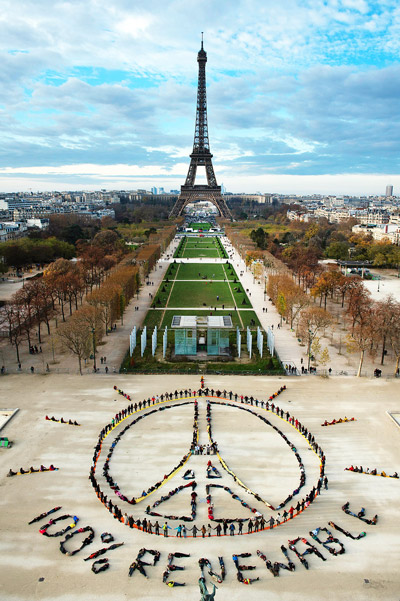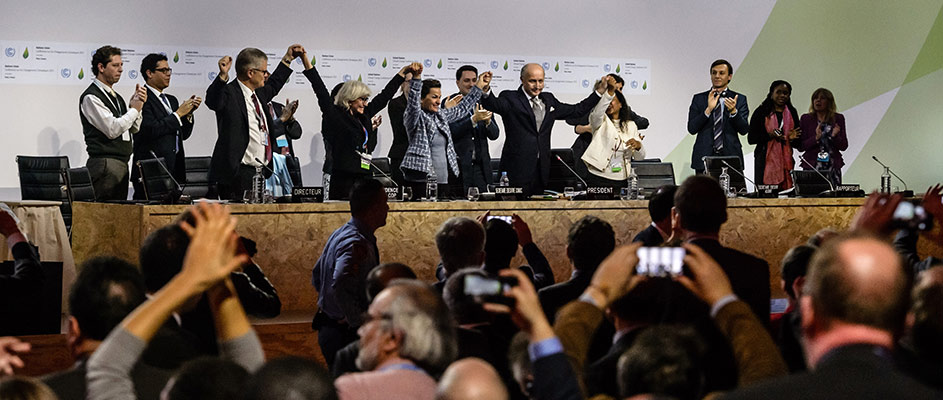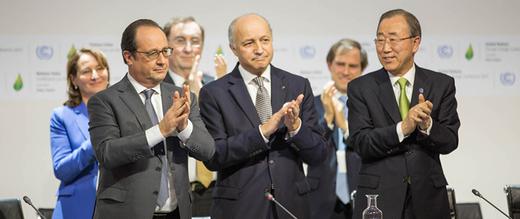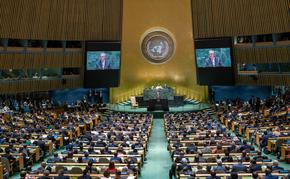The views expressed in our content reflect individual perspectives and do not represent the authoritative views of the Baha'i Faith.
The other night I watched the coverage of the final moments of the Paris Climate Talks on the news.
The footage showed world leaders applauding and cheering at the announcement that the world’s 195 nations had agreed on a climate change treaty. Then the cameras panned across the audience in the hall in Paris, and I could see that several people were in tears, so emotionally moved by the agreement that they couldn’t contain themselves.
 Suddenly, I began to cry myself.
Suddenly, I began to cry myself.
Which made me feel kind of surprised and silly, as I sat and watched other people on another continent and cried along with them.
Later I wondered why I felt so touched by that moment. I don’t cry often. I looked at the video footage again. I cried again. That made me really curious about my own feelings, so I sat down to meditate for a while, asking myself what in the world I was crying about. I wanted to identify the exact source of my feelings, and pinpoint the real reason I felt so moved.
At first I thought maybe my feelings had to do with our precious planet, which I love. Human beings have abused the Earth for so long, and finally, I thought, we’re waking up to that fact. We’re attempting, as a species, to do something about it. We’ve despoiled the beauty and majesty of the globe for profit, and science now tells us that our industrialized, mechanized societies must stop ruining nature.
I thought of the gorgeous Sierra Nevada Mountains to the east of my home, snow-capped this time of year, gleaming in the afternoon sun. I considered how all that glistening white snow provides the thawing bank of meltwater every spring that slakes our thirst through the summer and fall. I thought about the incredible, organic, self-sustaining design of that natural system, and how it keeps all things alive. I thought of how the sight of those mountains touches my heart when I see them, pure evidence of the creative, spiritual power of everything that lives.
That has to be the reason, I thought. But when I looked into my heart, I could see that wasn’t the real source of my tears. So I kept thinking.
My second thought: this has to be about the future. My wife and I have four children, and they’re now in their child-bearing years. They’re married or forming long-term relationships; they’re working diligently at their careers; they’re having children or getting ready to have children. One child, happily growing in the womb at the moment but ready to enter this wonderful bright world any time now, will generate enormous amounts of love and attention in our family. That little baby will soon grow into the future. That little baby is the future, a living symbol of what’s to come for the human race. I felt sure I had found the reason for my unexpected emotional outburst when I thought about the birth of that child and what he or she will mean for us and for humanity.
But the longer I thought about it, I realized I still hadn’t yet reached the core of my feelings. I was getting closer, I felt, but had to think and meditate a little while longer before I got there. I paused and said a Baha’i prayer I love:
Blessed is the spot, and the house, and the place, and the city, and the heart, and the mountain, and the refuge, and the cave, and the valley, and the land, and the sea, and the island, and the meadow where mention of God hath been made, and His praise glorified. – Baha’u’llah, Baha’i Prayers, p. i.
Then it hit me.
I suddenly realized why I cried as the Climate Talks closed with unanimous agreement. The key word: “agreement.” I felt, for the first time in my life, that the unity of the world could actually begin to happen. We could agree. We could, if we unified, protect the Earth and the life of every newborn child.

At no time in human history have we ever all unanimously agreed on anything—until now. A hundred and ninety-five nations—big and small, rich and poor, developed and developing—came together in one place, to address one massive problem, and guess what? We agreed. We found a way forward, in unity.
In the coming days you’ll probably hear all manner of post-Paris criticism and carping. Some will say “the agreement falls short because it doesn’t do enough,” and others will say, “the agreement will fail because it goes too far.” But the critics will miss the point. The message of COP21 in Paris isn’t the wording of an agreement—instead, it’s the very fact of agreement itself.
The Baha’i teachings ask: why couldn’t we address every problem this way? When wars break out, when terrorism plagues us, when famine strikes, when disasters occur, when people need help, why couldn’t we come together in unity, as a parliament representing the whole world, and stop the conflict, feed the hungry, house the homeless, protect nature? Why not? That, my friends, is no longer a dream. Paris has proven it can work—all we have to do now is make it happen:
In His Epistles [Baha’u’llah] asked the parliaments of the world to send their wisest and best men to an international world conference which should decide all questions between the peoples and establish universal peace. This would be the highest court of appeal, and the parliament of man so long dreamed of by poets and idealists would be realized. – Abdu’l-Baha, The Promulgation of Universal Peace, p. 388.

















Comments
Sign in or create an account
Continue with Facebookor